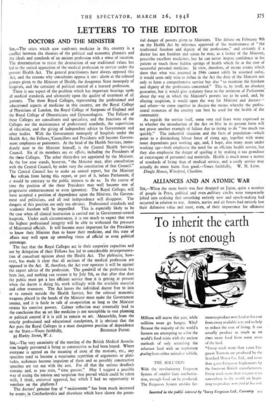Stn,—The very unanimity of the meeting of the British Medical
Associa- tion largely prevented it being as constructive as had been hoped. Where everyone is agreed on the meaning of most of the motions, etc., any speeches tend to become a wearisome repetition of arguments or plati- tudes, audiences become impatient of them and so possibly constructive speeches are cut out with the rest. For all that the serious deadlock remains and, as you state, "rinse presses." May I suggest a possible way of easing the tension and suspicion that prevail which could be taken with, I think, universal aRproval, but which I had no opportunity to ventilate on the platform 7 The doctors' genuine fear of " enslavement " has been much increased by events in Czechoslovakia and elsewhere which have shown the poten- tial danger of powers given to Ministers. The debate on February 9th on the Health Act by inference approved of the maintenance of "the traditional freedom and dignity of the professions," and certainly if a doctor has not freedom and status he may, as a lackey of the Minister, prescribe excellent medicines, but he can never inspire confidence in his patient or touch those hidden springs of health which lie at the root of successful personal medicine. In view, therefore, of recent events which show that what was assumed in 1946 cannot safely be assumed today, it would seem only wise to define in the Act the duty of the Minister not only to form a comprehensive service but also "to maintain the freedom and dignity of the professions concerned." This is, by itself, no absolute. guarantee, but it would give statutory force to the intention of Parliament about the way in which the Minister's powers 'are to be used, and, by allaying suspicion, it would open the way for Minister and doctors— and others—to come together to discuss the means whereby the profes- sional resources of the country can best be used for the health of the community.
As regards the service itself, some very real fears were expressed as to whether the introduction of the Act en bloc in its present form will not prove another example of failure due to trying to do "too much too quickly." The industrial situation and the facts of population—which point to a diminishing labour force of rising age, together with many more dependants past working age, and, I hope, also many more under working age—both emphasise the need for an efficient health service, but they also emphasise the danger of spoiling it by making it too grandiose or extravagant of personnel and materials. Health is much more a matter of standards of living than of medical service, and a costly service may actually do more harm than good.—Yours faithfully, W. N. LEAK.
Dingle House, Winsford, Cheshire.


































 Previous page
Previous page